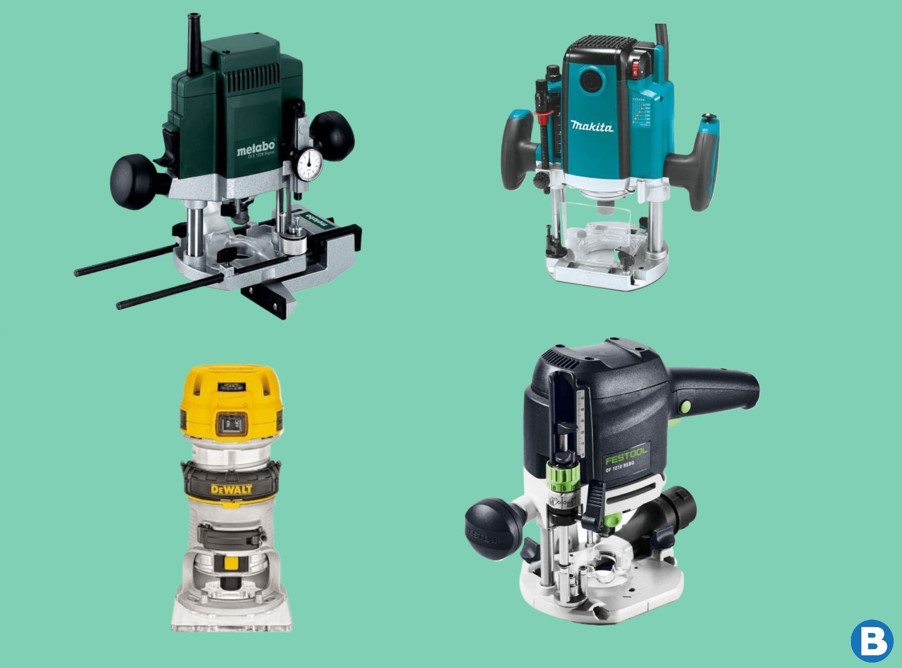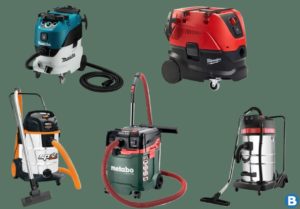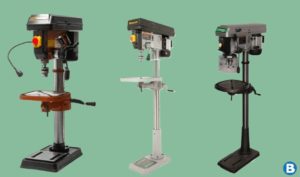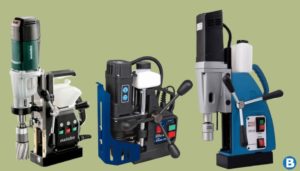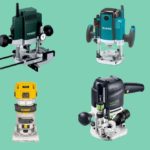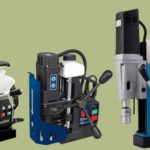If you’re a woodworking enthusiast or a professional carpenter in Australia, finding the right plunge router can greatly enhance the quality and precision of your work. A plunge router is a versatile tool that allows for precise cutting, shaping, and detail work in various woodworking projects.
However, with so many options available in the market, choosing the perfect plunge router can be overwhelming. That’s why we have curated this ultimate buying guide to help you navigate through the top picks for plunge routers for you.
From considering power and speed to evaluating features and accessories, we will provide you with all the essential information you need to make an informed decision and find the plunge router that matches your specific needs and preferences.
How to Choose the Best Drill Presse for you
Selecting the best plunge router requires careful consideration of your needs, the tool’s features, and how it will be used. Here’s a detailed guide on what to look for when choosing a plunge router:
Motor Power:
The motor’s horsepower (HP) determines the router’s capability to cut through various materials. For most general woodworking tasks, a router with 1.5 to 2.5 HP is sufficient. However, if you regularly work with hardwoods or require deep cuts, opt for a more powerful motor, up to 3.5 HP.
Low-power routers (1 – 1.5 HP): Ideal for light-duty and precision work, such as inlay and small edge profiles.
Mid-range power routers (1.75 – 2.25 HP): A versatile choice suitable for a wide array of tasks, including moderate profiling and dadoes.
High-power routers (2.5 – 3.5+ HP): Best for heavy-duty work, such as large cuts, panel routing, and use in router tables.
Speed Control:
Variable speed control allows you to adjust the RPM (revolutions per minute) of the router bit. It’s essential for working with different bit sizes and material types. A router with a speed range of 8,000 to 24,000 RPM will cover most woodworking projects.
Size and Swing:
Low speeds (8,000 – 12,000 RPM): Suitable for large-diameter bits and cutters, as well as specific tasks like plastic or aluminium cutting.
Medium speeds (12,000 – 18,000 RPM): Good for a range of intermediate-sized bits and general woodworking tasks.
High speeds (18,000 – 24,000+ RPM): Ideal for small-diameter bits and fine detail work.
Plunge Depth and Precision:
The plunge depth determines how deep the router bit can penetrate the material. Look for a router with an accurate and easily adjustable depth stop system. A depth of at least 2-3 inches is sufficient for most tasks.
Depth Stop: Enables you to set and repeat precise plunge depths, vital for tasks requiring accuracy such as mortising.
Micro-Adjustment: Some routers offer a fine adjustment feature for even more precise depth control.
Base and Handles:
A sturdy base provides stability and precision during routing. Clear, flat bases offer better visibility, while contoured handles provide comfort and control during use.
Base Material: Common materials include machined aluminium or clear polycarbonate, both offering stability and durability.
Handle Design: Ergonomic handles can minimise fatigue during extended use. Some plunge routers have D-handles or knob-style handles for different grip preferences.
Dust Collection:
Good dust collection capabilities help keep the work area clean and improve visibility. Integrated dust ports that can be connected to a vacuum system are a valuable feature.
Built-in Dust Ports: Check for a router with a port size compatible with your dust collection system.
Effectiveness: Look for models with a good track record of efficient dust removal to maintain a cleaner work environment.
Accessibility and Convenience Features:
Features such as a spindle lock for easier bit changes, soft start for gradual ramp-up of speed, and constant response circuitry to maintain speed under load add convenience and safety.
Spindle Lock: Allows for one-wrench bit changes, speeding up the process of switching bits.
Soft Start: Reduces torque upon startup, providing better control and extending motor life.
Constant Response Circuitry: Helps maintain consistent speed during cuts for a smoother finish and preventing overload.
Read Next: Best Magnetic Drills | Demolition Hammers | Heat Guns
The Best Plunge Routers Australia
1. Makita RP2301FC05
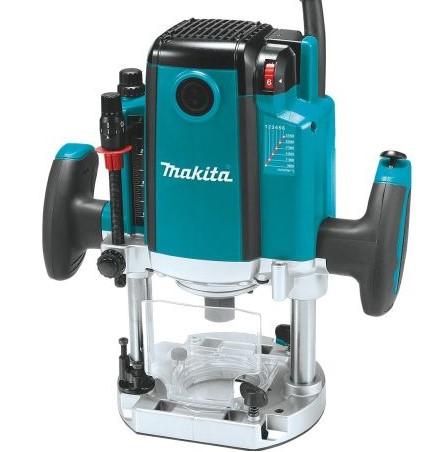
The Makita RP2301FC05 Plunge Router boasts a significant plunge capacity ranging from 0 to 70mm, offering depth versatility for a broad spectrum of routing tasks. Fitted with a 12.7mm collet, it can accommodate commonly used bit sizes, ensuring compatibility with a variety of routing applications.
At the heart of the router is a powerful 2,100W motor that ensures consistent performance, coupled with a speed range spanning from 9,000 to 22,000rpm. This allows the user to adjust speeds to the intricacies of the material being worked on, ensuring precision in every cut.
Designed for practicality, the unit features a base measuring 170 x 155mm and maintains an overall length of 312mm. Weighing in at 6.1kg, it is relatively easy to handle, and its 2.0m power supply cord provides sufficient reach for user movement. The Makita RP2301FC05 is an essential tool for professional woodworkers who require power and precision in their routing tasks.
2. Dewalt D26204K-XE
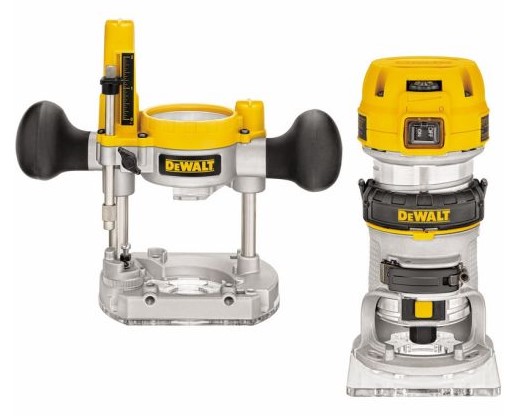
The Dewalt D26204K-XE combines precision and adaptability for a wide range of routing tasks. Its full-wave electronic speed control with feedback ensures that the desired speed is maintained consistently across various materials, resulting in a uniform finish whether you’re working with timber, aluminium, or plastics.
Versatility meets performance, as the speed can be varied from 16,000 to 27,000rpm, allowing for optimal bit speed based on the specific application. The router’s design is both compact and lightweight, enhancing both ease of use and user comfort during extended routing tasks.
Key features include a quick-transition aluminium motor housing for changing to a fixed base, a precise depth adjustment fine-tune rod, and a five-position adjustable turret for repetitive plunge cuts. Comfort is prioritised with over-molded rubber handles, and dual LED lights provide excellent visibility. With the added convenience of multiple spindle lock detents, router bit changes are efficient and hassle-free, making the Dewalt D26204K-XE a reliable choice for professionals seeking controlled, versatile, and comfortable routing solutions.
3. Festool OF 1010R
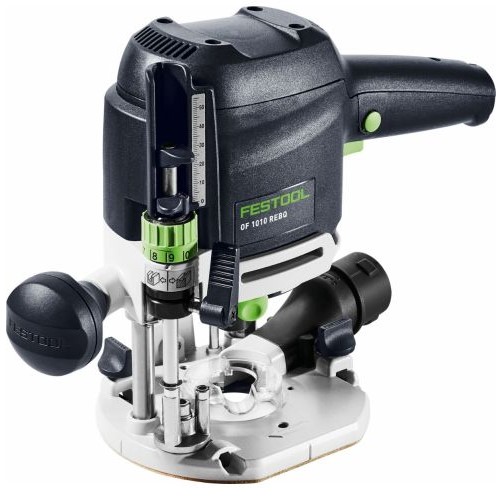
The Festool OF 1010R plunge router is characterised by its impressively lightweight design, weighing in at just 2.70 kg, which greatly benefits user manoeuvrability and reduces fatigue during prolonged use.
An adaptable no load speed range of 10,000 to 24,000 rpm allows for tailored speed settings to match the intricacies of the material and routing task at hand. The router’s dust extraction connection with a 27 mm diameter works to maintain a cleaner work environment, essential for both health and precision.
The OF 1010R offers a collet diameter suitable for 6 – 8 mm bits and provides a routing depth adjustment range of 8.00 mm, ensuring accurate depth control. The routing stroke is a generous 55.00 mm, complemented by a 50.00 mm bench opening. With a corded power source, a convenient Plug-it power lead, and a power consumption of 1010 W from its brushed motor, this tool is designed for reliability and fine detail work in a variety of routing applications.
4. Metabo OFE1229SIGNAL
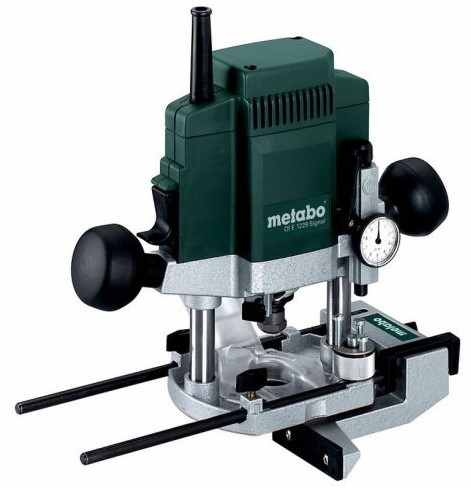
The Metabo OFE1229SIGNAL is crafted with precision in mind, offering a substantial maximum stroke height of 50 mm, which allows for deep and intricate routing work. The no-load speed versatility, adjustable from 5000 to 25500 rpm, provides flexibility to suit various materials and applications.
Powered by a 1200 W motor and boasting an output of 780 W, the OFE 1229 SIGNAL is constructed to deliver consistent revolutions even under load, maintaining the maximum rated speed of 25500 rpm. This ensures a constant, quality finish across tasks.
Fitted with an 8 mm collet chuck bore, the router accommodates a standard range of bits for versatility. Its weight of 3.5 kg strikes a balance between sturdiness and ease of operation. Enhanced with a 4 m power cable, this offers extended reach for user convenience, establishing itself as a reliable tool for detailed and demanding routing operations.
FAQ’s
Are plunge routers worth it?
Plunge routers are worth it for woodworkers requiring versatility. They allow precise vertical bit placement, ideal for through cuts, mortises, and dadoes, offering depth control and safety for intricate work. Their design enhances user control and adaptability for a wide range of routing tasks.
What is the difference between Makita and Ryobi plunge router?
Makita plunge routers typically offer higher performance, robust build quality, and features aimed at professionals, with powerful motors and advanced features like variable speed control. Ryobi plunge routers are generally more budget-friendly, designed for DIY enthusiasts, with sufficient capabilities for casual or less frequent use.
Which is better, Makita or DeWalt?
Makita and DeWalt both offer high-quality power tools. Makita is renowned for innovation and compact design, often favoured for extended use. DeWalt is known for robustness and reliability, with a strong presence in the professional market.
